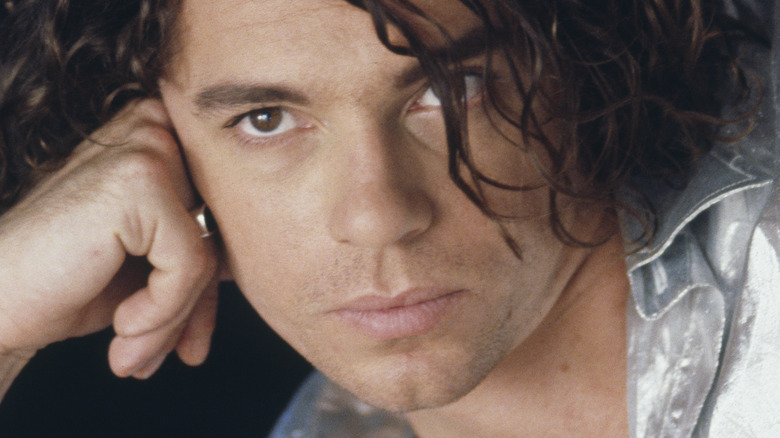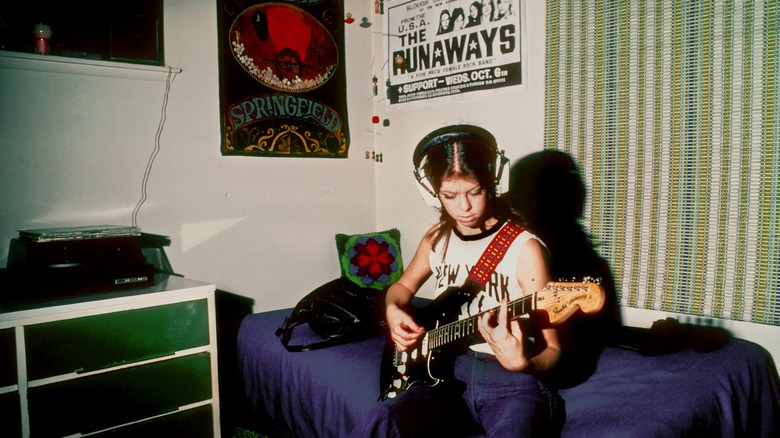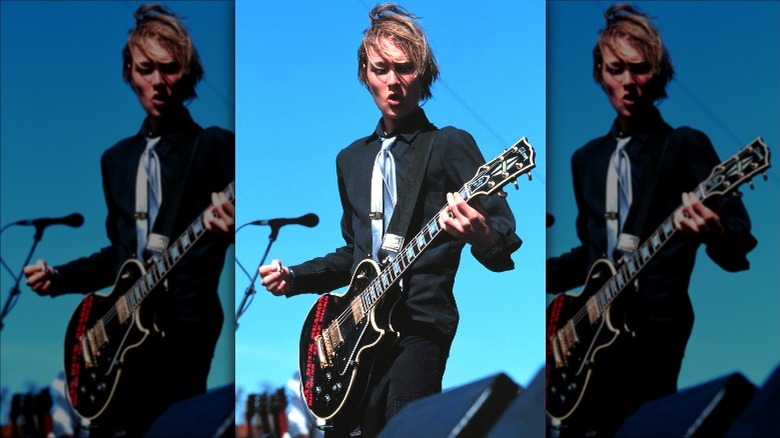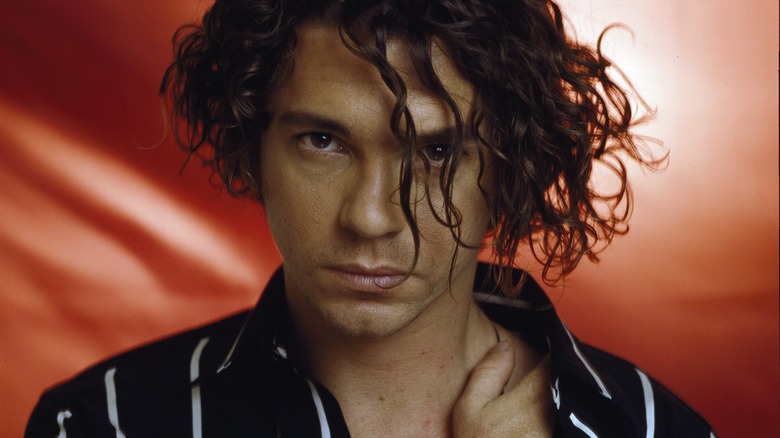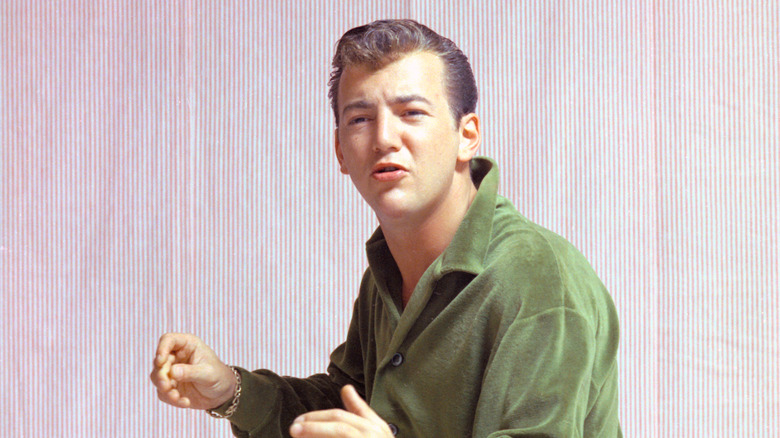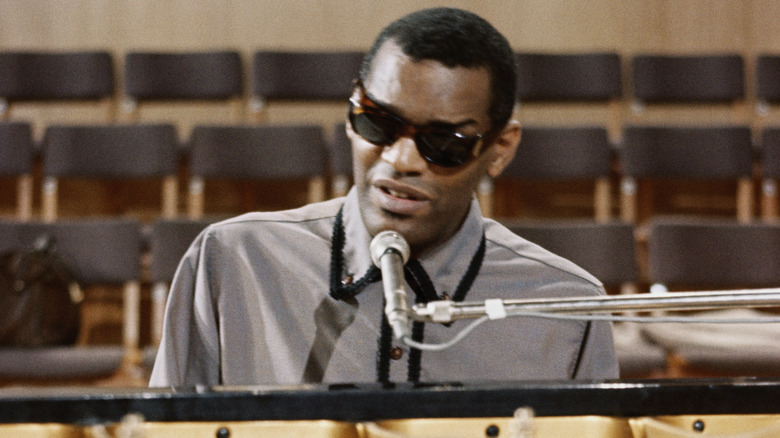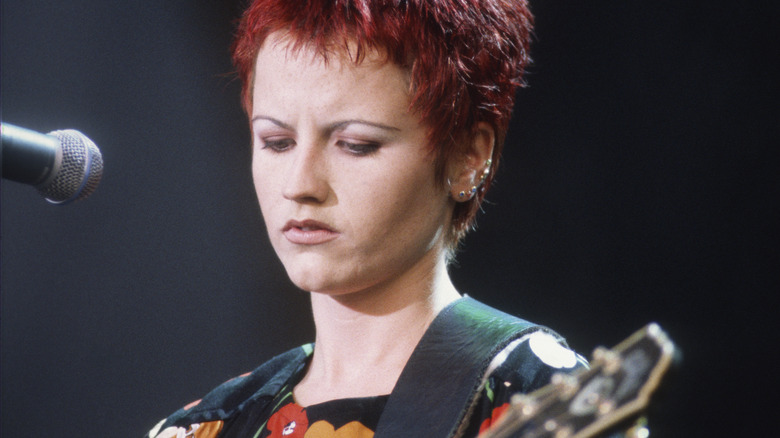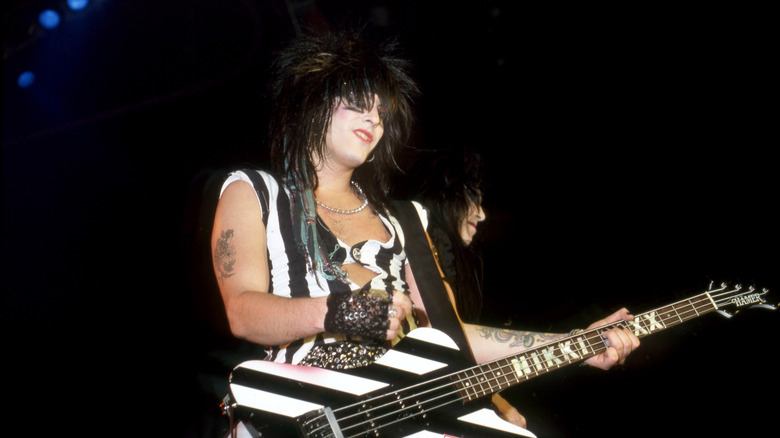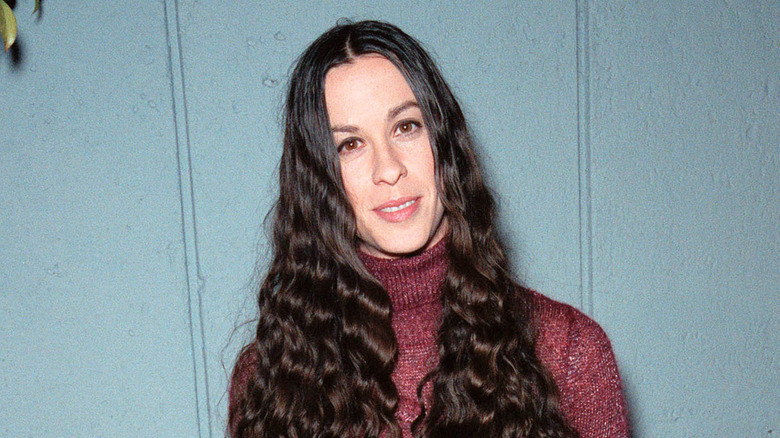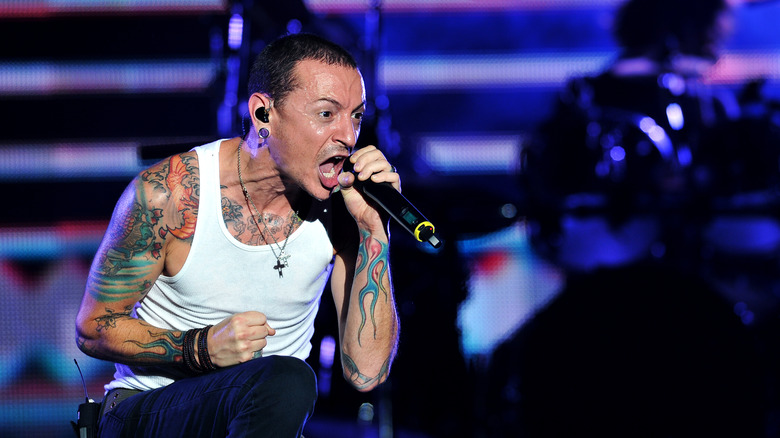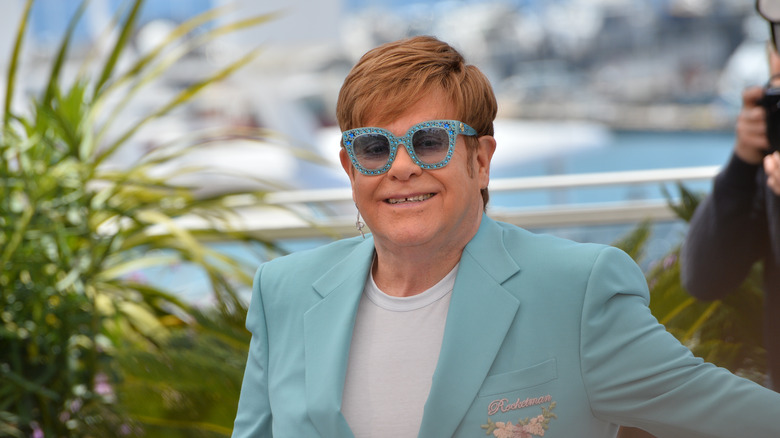Rock Stars That Hid A Tragic Secret For Years
There's no reason that being good at playing a certain type of music means you need to have a personality type that's just as loud, strong, and aggressive. But rock musicians often used to play up to this stereotype, trashing hotel rooms, romanticizing abusive relationships both with romantic partners and bandmates, and presenting a tough-as-nails exterior to their fans. But underneath, many of these seemingly invincible rock stars were hurting, badly. No matter how rich or famous they became, it couldn't keep bad things from happening. The best one can hope for as a rock musician who has dealt with trauma is that money and a flexible schedule will make it easier to get therapy and other treatment.
Unfortunately, there is also the added burden of deciding if they want to tell their fans about the issues they are dealing with. For a variety of very valid and personal reasons, many choose not to, which means having to deal with the stress of hiding their secret, in some cases for years.
Many rock stars who went through something horrible will eventually tell the world about what happened after they have had time to process it themselves. Other times, they take the secret to the grave, and fans only learn after their hero's death the terrible weight they lived with. Here are rock stars who hid a tragic secret for years.
This article contains references to sexual assault, child abuse, eating disorders, suicide, and addiction issues.
Jackie Fuchs
Women in the music industry are still treated terribly. Now imagine how much worse it must have been to be a young, inexperienced girl in the music industry in the 1970s. Jackie Fuchs of the all-girl rock band The Runaways learned what powerful people could get away with, and girls had to put up with.
In 1975, Fuchs and the band finished a gig and then went to an afterparty, where the barely-16-year-old-girl was given Quaaludes. She lay down, drifting in and out of consciousness. Fuchs and others present allege that her manager Kim Fowley, then in his mid-30s, raped her while the party guests watched. Because of her age, level of intoxication, and the fact that she said no, Fuchs did not and could not consent. Some people left in disgust, but no one did anything to stop it or report the crime.
Fuchs says that when she went to band practice a few days later, it was obvious none of the other girls wanted to talk about it or acknowledge what had happened. She says that was when "the elephant joined the band." She didn't tell the wider world the truth about what happened until she spoke to the Huffington Post's Highline in 2015. Why? "I didn't know if anybody would have backed me," she said. "I knew I would be treated horribly by the police—that I was going to be the one that ended up on trial more than Kim. I carried this sense of shame and of thinking it was somehow my fault for decades."
If you or anyone you know has been a victim of sexual assault, help is available. Visit the Rape, Abuse & Incest National Network website or contact RAINN's National Helpline at 1-800-656-HOPE (4673).
Daniel Johns
Daniel Johns of Silverchair was just 15 when his band released their debut album, according to Who Australia. By the time he was 18 and their second album was an even bigger hit, he was fighting depression. There was another mental health problem he was dealing with, too, and from what the papers printed at the time, it should have been obvious. "Johns is slim to the point of thin," the Sydney Morning Herald wrote in 1997. "His jeans and shirt hanging loosely from him." Another reporter called him "dangerously emaciated."
Daniel Johns' biographer Jeff Apter said, "It was almost as if he was trying to physically disappear." Looking back at his struggle, Johns explained, "The only way I can describe it, is to say that it felt comforting to be in control of something, like I hadn't totally lost it." As a way to have that sense of control over his life, he restricted what he ate more and more, until he would only eat when forced to or when he was about to pass out. Eventually, this led to the paranoid belief that "every chef in the world wanted to poison me" and that apples contained hidden razor blades.
After getting a cold that wouldn't go away and finally seeing a doctor, Johns was told in no uncertain terms that he had to start eating again or he was going to die. Johns eventually recovered, but he kept his struggle from the public until his biography was released in 2018.
If you are struggling with an eating disorder, or know someone who is, help is available. Visit the National Eating Disorders Association website or contact NEDA's Live Helpline at 1-800-931-2237. You can also receive 24/7 Crisis Support via text (send NEDA to 741-741).
Michael Hutchence
It wasn't a secret that INXS frontman Michael Hutchence was punched by a taxi driver outside a Danish pizzeria in 1995. But until decades after he died, only one person knew just how badly that single punch had injured him, according to Sky News.
Overnight, Hutchence's personality saw drastic changes, with "sudden mood swings and temper outbursts." He also lost his sense of taste and smell. Only his girlfriend at the time, supermodel Helena Christensen, knew just how bad the situation was and he made her swear not to tell anyone. To others, the outbursts were just seen as regular rock star behavior.
Filmmaker Richard Lowenstein directed some of INXS's music videos and made a 2019 documentary about Hutchence, which was when he first learned about the singer's extensive brain injuries from interviewing Christensen and reading the full autopsy report. The punch had done serious injury to Hutchence's frontal lobes. Why keep it secret, though? Lowenstein says, "If it had gotten out – even just between the band members – that he had serious damage to the brain, they would have come in and started writing the songs themselves. And that was his worst nightmare." As for why Hutchence didn't even tell his final partner and mother of his child, Paula Yates, Lowenstein says he might have worried she would "maybe not love him quite so much or treat him like an invalid. He didn't want to be seen as less of a person than he was before the accident." Hutchence died by suicide in 1997.
If you or anyone you know is having suicidal thoughts, please call the National Suicide Prevention Lifeline at 1-800-273-TALK (8255).
Bobby Darin
Bobby Darin's early death at just 37 had come as no surprise, as his son Dodd explained to People Magazine in 1994 (via BobbyDarin.net), because as a boy, Bobby's heart was damaged from an illness. "My father knew he wouldn't live long," Dodd said. "He was trying to pack a lifetime of ambition into what little time he had." He was a very successful singer in the 1960s, with a close family. But five years before he died, he'd learn that some of his family members weren't who he thought, according to "Bobby Darin: A Life."
It was Bobby's talk about running for office that finally got his mother, who he had grown up thinking was his sister, to come clean. Bobby's half-brother Gary (not his cousin, like he believed), told Bobby's biographer that their sister told their mother, "You've got to tell [him] ... if he goes into politics, they will uncover the truth. And better that he knows it up front than trying to find it out in some other way."
Bobby's mother Nina was only 17 and unmarried when she got pregnant with him, leading to the deception that his grandmother was his mother. Nina also refused to tell him who his father was. As you might expect, "Bobby didn't take the news well." Gary explained, "Bobby never questioned it. Once he heard the words said to him, 'I'm not your sister, I'm your mother,' he knew it was the truth ... Unfortunately, he could never accept it." Bobby took the secret to his grave.
Ray Charles
Addiction is a painful and complicated disease, and Ray Charles had the extreme misfortune of being a celebrity whose excessive drug use was paraded in front of the world in the cruelest way possible. According to the Weekly View, while at a tour stop in Indianapolis in 1961, Charles received an unsolicited phone call offering to sell him drugs. He purchased weed and heroin, and later got high. The next morning, however, cops showed up at his hotel room door saying the drug dealer had tipped them off.
Charles was purposely humiliated, both with the charge of being a "common addict" and by being paraded in front of the media. One reporter asked, "How did you get started on drugs, Ray?" He told the sad story. "I started using stuff when I was 16. When I first started in show business. Then I had to have more and more ... A guy who lives in the dark has to have something to keep him going. The grind is just too much."
The public learning his secret did not stop Charles using heroin. As he told Rolling Stone in 1973, "Let's face it, man, if a guy doesn't want to stop doin' somethin', the judge, the psychiatrist, the jailer, ain't nobody gonna ... it's a made-up mind of what you want to do with yourself." Charles finally got clean after another drug bust in 1965.
If you or anyone you know is struggling with addiction issues, help is available. Visit the Substance Abuse and Mental Health Services Administration website or contact SAMHSA's National Helpline at 1-800-662-HELP (4357).
Dolores O'Riordan
In 2013, lead singer of The Cranberries, Dolores O'Riordan told reporter Barry Egan of the Irish Independent a horrible secret she'd been carrying around for decades: "For four years, when I was a little girl, I was sexually abused. I was only a kid."
While telling anyone that information, let alone a reporter, took incredible bravery, O'Riordan found it was worth it. A month later when speaking to Egan again, she told him how it was "amazing to have the burden lifted off my shoulders; it is almost like going into therapy and confessing it, except you do it the other way around, because when you are famous you just open up and that is it. It does feel good to have that off the shoulders. I feel a definite sense of relief. I don't have to explain it to people. It happened. And you know, I think it makes people understand who you are and how you are a little bit better." They discussed everything that had happened in her life since the horror of her childhood, and she seemed genuinely happy with how it had all worked out. Hopefully, telling the public about her trauma helped her excise those demons.
Tragically, the BBC reports that O'Riordan died of accidental drowning in a London hotel room in 2018, after passing out from alcohol intoxication in the bathtub. She was 46.
If you or someone you know may be the victim of child abuse, please contact the Childhelp National Child Abuse Hotline at 1-800-4-A-Child (1-800-422-4453) or contact their live chat services.
Nikki Sixx
Nikki Sixx was maybe the hardest rocking of all the hard partying members of Mötley Crüe. In 2007, Sixx released a book about his life during the band's heyday, framed around diary entries he wrote throughout 1987.
One entry's first line is especially shocking: "I've decided I should do something special for Valentine's Day to mark the anniversary of the day that I died." Considering Sixx titled the book about his life "The Heroin Diaries," it's not surprising what almost killed him. Sixx explains what happened the year before, on February 14, 1986, in London. Right after getting offstage, he went to a drug den, and the first hit was too much: "I OD'd on the spot. My lips turned purple: I was gone. The story I heard was that the dealer grabbed his baseball bat and tried to beat the f***ing life into me. He couldn't, so he flung me over his shoulder to dump me in the trash, because nobody wants a dead rock star lying around. Then I came to ... and I guess I had yet another dark secret to never tell anybody."
It was far from the first time this had happened to him. Later in the book Sixx notes that by 1987, "I'd had many secret overdoses and seizures." One final OD at the end of that year would, thankfully, lead to him and the rest of the band getting clean.
If you or anyone you know is struggling with addiction issues, help is available. Visit the Substance Abuse and Mental Health Services Administration website or contact SAMHSA's National Helpline at 1-800-662-HELP (4357).
Alanis Morissette
Alanis Morissette was huge in the 1990s, but had actually entered the entertainment industry even earlier, appearing on Nickelodeon's "You Can't Do That On Television" at just 10, and getting her first record contract at 14, according to the Encyclopedia Britannica. The music industry is rarely good to young girls, and in 2021, Morissette told a documentary filmmaker (via the Washington Post) she'd been abused at that age.
"I never talk about this. It took me years in therapy to even admit there had been any kind of victimization on my part," she said. "I would always say I was consenting, and then I'd be reminded like 'Hey, you were 15, you're not consenting at 15.' Now I'm like, 'Oh yeah, they're all pedophiles. It's all statutory rape." Horrifically, even though she did try to tell people what was happening, no one intervened. "I did tell a few people and it kind of fell on deaf ears," Morissette said. "It would usually be a stand-up, walk-out-of-the-room moment."
Morissette had spoken in more general terms about exploitation and abuse in the industry the year before, as well. However, a weird controversy erupted over the documentary in which Morissette told the world her tragic secret. She never named the people who assaulted her and never took the accusations back, but she backed out of supporting the documentary about her career after she was unhappy with the final product.
If you or anyone you know has been a victim of sexual assault, help is available. Visit the Rape, Abuse & Incest National Network website or contact RAINN's National Helpline at 1-800-656-HOPE (4673).
Chester Bennington
Frontman of Linkin Park Chester Bennington had been open with his fans about his substance abuse issues, but it wasn't until 2008 that he told a reporter he'd been using drugs to cope with horrible childhood trauma. Bennington revealed to Kerrang (via the Irish Sun tabloid), that around the time he was 7 years old, a "friend a few years older than him" began sexually abusing him. The abuse continued until he was 13. "It escalated from a touchy, curious, 'what does this thing do' into full-on, crazy violations," Bennington said. "I was getting beaten up and being forced to do things I didn't want to do. It destroyed my self-confidence."
It would be six years before Bennington felt he could tell anyone in his life about the horrible things that were being done to him. His parents were distant and there was no one he trusted to tell. "I didn't want people to think I was gay or that I was lying," he explained. "It was a horrible experience." While Bennington opened up to his fans about the assaults, he never said who the perpetrator was.
Tragically, Bennington died by suicide in 2017. He was 41.
If you or someone you know may be the victim of child abuse, please contact the Childhelp National Child Abuse Hotline at 1-800-4-A-Child (1-800-422-4453) or contact their live chat services. If you or anyone you know is having suicidal thoughts, please call the National Suicide Prevention Lifeline at 1-800-273-TALK (8255).
Elton John
In his 2019 autobiography (via US Weekly), Elton John revealed to his fans that two years previously he'd been diagnosed with prostate cancer, and kept his treatment a secret. He was in the middle of preparing for his massive, worldwide farewell tour at the time, and the diagnosis must have been terrifying. The only good news was that the cancer was found in its early stages. Elton's doctors gave him the choice of chemotherapy or having his prostate removed.
The musician took the more aggressive approach, writing (via the Telegraph), "I went straight for the surgery. A lot of men won't have it, because it's a major operation, you can't have sex for at least a year afterwards and you can't control your bladder for a while. But effectively my kids made the decision for me. I didn't like the idea of cancer hanging over me — us — for years to come: I just wanted rid of it."
But while the surgery was successful (and Elton was onstage again just 10 days later), he wasn't out of the woods yet. He writes that he then "contracted a major infection in South America," which was so serious that his doctors told his husband David Furnish that Elton "was 24 hours away from death." But he pulled through, saying, "I wasn't ready to die yet." Even fans who'd seen him in concert in the years between his diagnosis and his book coming out likely had no idea Elton John had been having such serious health problems.
